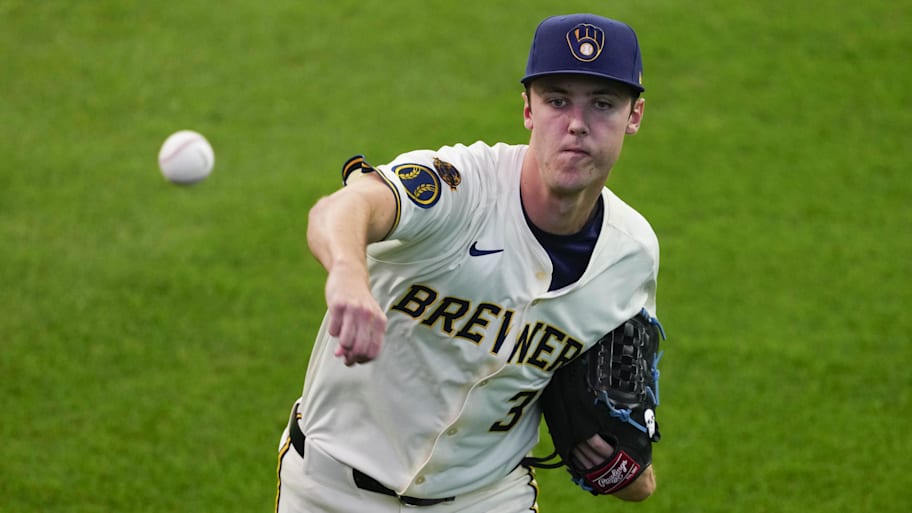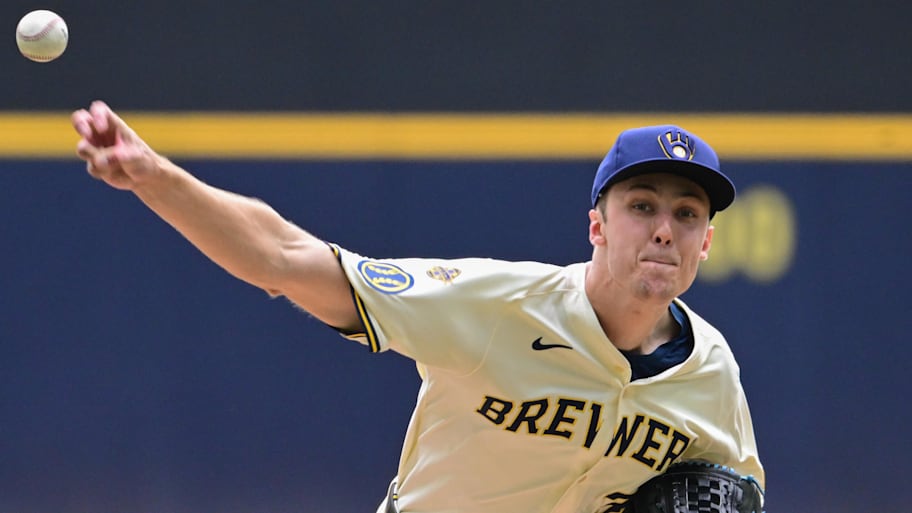
ATLANTA — Sometime around the late innings Tuesday night, the home bullpen door at Truist Field will swing open and out will come running a baseball fairy tale waiting to be told. You will know it is Jacob Misiorowski of the Milwaukee Brewers by his Ichabod Crane figure, his aw-shucks, Missouri-bred Tom Sawyer smile and his holy spit fastball. Midsummer evening in Georgia suddenly will feel hotter, batters will shake their heads in wonder and jaws will drop.
Misiorowski is that special. He is 23 years old and looks even younger. He is as thin as a paper clip and aglow with so much joy and so wide a grin he can’t stop using the word “cool.”
Just five starts under the belt around his slim waist, he also is at the center of the biggest and most wrong-headed controversy at this All-Star Game. The gripe, largely fostered by the Philadelphia Phillies and assorted media, was that Misiorowski did not “deserve” his selection. Never mind that pitchers left and right couldn’t be bothered to pitch in the All-Star Game and that the honor meant so much to Misiorowski that he cried when he was told of his selection.
And then there is this: Misiorowski throws the meanest fastball in baseball, a 99.3 mph rocket with an absurd, gravity-defying 2,599 rpm spin, a wickedly low release point and so much extension he lets go of the ball a foot closer to home plate than the average pitcher. And he’s been historically great in his brief but captivating time on the MLB stage.
Misiorowski is exactly what the All-Star Game is: a showcase of the best talent in baseball, not a WAR calculating exercise. He is a sensation (without the mound-scaping and talking-to-the-ball soliloquies) in the manner of Mark “The Bird” Fidrych, who started the All-Star Game with just 11 starts. With the way the world moves, five starts in 2025 is darn close to the exposure of 11 starts in 1976.
If you don’t want Misiorowski, you don’t want entertainment. And you don’t want baseball fairy tales.
Just two years ago on this date Misiorowski was pitching in front of 4,175 people in Peoria for the Class A Wisconsin Timber Rattlers. Five years ago, after COVID wiped out his senior season at Grain Valley High and no team drafted the skinny righthander, he decided he’d rather pitch for the Crowder College Roughriders, a community college in Missouri with an enrollment of 3,800, than accept an offer from Oklahoma State.
“Well, I just think that’s what I needed,” he explains. “I think I needed a small town to just get my feet wet and get acclimated to collegiate ball.”
I asked him to give me the scouting report on his 18-year-old self. “I was really, really skinny. Really lanky.”
What does that mean, weight-wise? “Like 170, 165.”
Same height? Six-feet-seven? “Yeah. Pretty close.”
He continues with the scouting report: “He’s going to throw a lot of fastballs. He doesn’t always know where it’s going to go. He knows, be ready to get hit. So, it’s, yeah, I think that’s the biggest threat: it’s just, ‘Don't get hit.’”
He made 15 starts for Crowder in 2022, then decided to transfer to LSU, where he would have joined Paul Skenes. But the Brewers drafted him in the second round—after 62 players were picked—and gave him $2.3 million, mid-first round money, to sign. Misiorowski needed to gain weight (he has put on about 25 to 30 pounds) and iron out his mechanics. He was a strikeout machine in the minors (12.3 strikeouts per nine) but lacked command (5.4 walks per nine). But counterintuitively, he commands the baseball much better in the big leagues with four pitches than he did in the minors. He has an old school explanation for that.
“Adrenaline,” he says. “I think that's the biggest thing. You know, I think it was just one of those things that happens when you settle down, like you learn to be where your feet are and have fun.”

As thin as your chances of hitting his fastball, Misiorowski has been an optical wonder. No one throws the ball this fast this close to the plate with this much spin. In each of his four wins he has beaten an All-Star: Sonny Gray, Joe Ryan, Skenes and Clayton Kershaw, who wasn’t even sure of the kid’s name when Misiorowski dominated the Dodgers like few pitchers have ever done. Misiorowski joined Dwight Gooden (19 years old in 1984) and Louis Drucke (21 in 1910) as the youngest pitchers to beat the Dodgers with as many as 12 strikeouts and no more than one walk.
“Yeah, speechless,” he says. “It’s one of the things you dream about, basically. It’s the Dodgers, so it's really cool to perform the way I did.”
Those “undeserving” five starts are historically great, with Les Mis winning four times with 33 strikeouts and a 2.81 ERA. Only five other pitchers started like that through five starts, beginning with Noodles Hahn in 1901 through Jesse Hahn in 2014 and with Cy Blanton (1934–35), Bo Belinsky (1964) and Yu Darvish (2012) in between.
Misiorowski meets all the history and all the success with a wide-eyed grin. You half expect him to offer you the chance to paint a picket fence.
“I mean, it’s really cool,” he says. “No way I imagined this. Not a chance.”
Still, Misiorowski was a long shot to make the team. Eight pitchers originally were named to the team, including Zack Wheeler of the Phillies. Wheeler bowed out, especially after learning that Skenes was starting instead of him. Pitchers who pitched Sunday, such as Cristopher Sanchez of the Phillies, were out. MLB asked Ranger Suárez to pitch in the All-Star Game. He declined. According to one source, MLB went through 13 more pitchers—21 in all—before they finally landed on a willing, able and, yes, deserving Misiorowski. You could pick a relief pitcher having a good season, such as Emilio Pagán, or you could pick an honest to goodness sensation.
Ask what he loves most about pitching and he says, “Just competing against the guy in the box. I think that's the coolest part. You get to face the guys that are, you know, in The Show. You’re like, ‘Holy cow, this is that dude!’ And now you’re like, ‘Okay, now I’ve got to beat this guy. Let’s go!’”
Misiorowski’s combination of talent and youth is as refreshing as the answer he gave to what he expected from pitching in the All-Star Game: “Nothing. I’m just trying to make it through and have fun.”
Tuesday night will mark the official introduction of Jacob Misiorowski of Blue Springs, Mo.—about 200 miles from Hannibal, Mo.—to the national baseball stage. Such are the moments that make the All-Star Game the grand showcase of talent that it is designed to be. And if adrenaline is his secret to command, what will the adrenaline be like coursing through his whippet of a body in that moment under the lights?
“Through the roof,” he says. “More than any other game.”
There is a scene in The Adventures of Tom Sawyer when Tom attempts to convince Huckleberry Finn to accept the ways in which the Widow Douglas wants to teach him manners and civility. Mark Twain used the Widow Douglas as a proxy for the confining ways of proper society, analogous to staying within the lines of a coloring book or, as All-Star Games go, inviting only the “deserved” who have paid their dues in full.
“Well, everybody does it that way, Huck.”
“Tom,” Huck replies, “I am not everybody.”
More MLB on Sports Illustrated
This article was originally published on www.si.com as Jacob Misiorowski Represents What All-Star Games Are All About.







